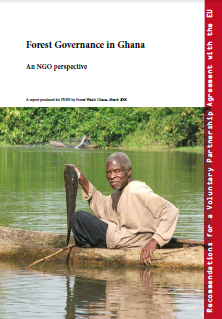Forest Governance in Ghana: An NGO perspective
Summary
Ghana’s forestry sector is in deep crisis. The timber industry-led assault on this resourceis building towards ecological catastrophe. The state’s failure to capture even a minimal portion of resource rent for the public and for the communities that own and depend onthese forests for their livelihood has created a social catastrophe. The descent of affected communities into poverty, social decay, conflict, and violence threatens a political and security catastrophe as well. Ghana’s forest sector has an elaborate superstructure of constitutional rights, seemingly progressive policies, comprehensive laws, well-developed institutions, and a cadre of welltrainedprofessional foresters. The workings of the sector are, however, determined largely by the substructure of exploitative and repressive relations between the corporate timberindustry and the state on the one hand and forest-dependant communities and the publicon the other. These relations, established under colonial rule, remain intact throughout the natural resource sector 50 years after independence. Recognition that the sector needs governance reform rather than just technical assistance and credit is an important step forward. Governance initiatives that focus solely on the superstructure (laws and policies) without addressing the basic political economy offorestry and the wider extractive sector cannot lead to change. NGOs believe that the European Union (EU) Forest Law Enforcement Governance & Trade (FLEGT) and Voluntary Partnership Agreement (VPA) strategies have the capacity to disrupt the existing political economy for the better. If the EU and timber buyers ally themselves, however temporarily or tangentially, with the environmental and social justice agenda, it will create space for peaceful reform. The European Commission and European buyers can support the participation of NGOs and community representatives in the VPA process politically and materially; they can, inparticular, support a definition of “legality” that substantively addresses pressing socialand environmental concerns and not just formal legislative processes. This precedent would represent a significant breakthrough for the sector. NGOs will work with and forsuch a VPA process in addition to pursuing other initiatives.


 Twitter
Twitter Google+
Google+ Facebook
Facebook LinkedIn
LinkedIn Digg
Digg del.icio.us
del.icio.us StumbleUpon
StumbleUpon